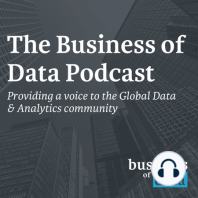30 min listen

Aleksandar Lazarevic: Effective Data Strategies Require Constant Iteration
Aleksandar Lazarevic: Effective Data Strategies Require Constant Iteration
ratings:
Length:
30 minutes
Released:
Sep 28, 2020
Format:
Podcast episode
Description
Data leaders must update their strategies continually to stay aligned with business objectives, argues Dr Aleksandar Lazarevic, VP of Advanced Analytics and Data Engineering at Stanley Black and Decker
When Dr Aleksandar Lazarevic joined industrial tools manufacturer Stanley Black and Decker 18 months ago, he set to work updating its analytics strategy to drive company-wide analytics adoption.
In this episode of the Business of Data podcast, he outlines his approach to creating an analytics roadmap that accounts for data availability, data quality and business readiness.
“Most analytics projects, in my opinion, fail because they don’t have proper business partnership,” he says. “It requires a lot of iteration, working with the business together, trying to figure out what the right business needs are.”
For Dr Lazarevic, data science is an iterative process. As such, data leaders must work closely with partners in IT and specific business units to assess the business’ needs and prioritize projects accordingly.
“What is the right business problem to solve?” he asks. “What is the right analytical solution? What are the right KPIs you need to track? And, how you can quantify this and make sure the business adopts your solution?”
Importantly, Dr Lazarevic argues that data leaders must ask these questions continually and update their strategies in line with changing circumstances. This idea has been particularly salient with respect to delivering predictive analytics projects in the age of COVID-19.
Dr Lazarevic explains: “In addition to using the data from last year, which could not be relevant, we tried to use other economic indicators, financial indicators, stock indexes or particular trends and tried to incorporate them into the models we were trying to build.”
COVID-19 has accelerated digital transformations across the world. But despite the increased demand for data-driven insights, Dr Lazarevic says enterprises must still deal with the challenges that held them back before the pandemic.
“There is a lack of understanding or lack of comprehending [about] what the art of the possible within the data and analytics world is,” he notes. “I believe considering the business aspects and people recognizing how particular analytics techniques would be relevant to them is the key.”
He concludes: “What we’re trying to do is to provide not only those technical courses, but also to work with several vendors to [coach] people on how they can analytically think for some of the use cases.”
Key Takeaways
Revisit your data strategy roadmap regularly. Data leaders must continually update their strategies to keep them aligned with business objectives
Building strong business partnerships is key. Data teams must work closely with IT and business unit stakeholders to develop effective data-driven tools
Teach the art of the possible. Sharing case studies and success stories and building data literacy is essential for nurturing demand for data within an organization
When Dr Aleksandar Lazarevic joined industrial tools manufacturer Stanley Black and Decker 18 months ago, he set to work updating its analytics strategy to drive company-wide analytics adoption.
In this episode of the Business of Data podcast, he outlines his approach to creating an analytics roadmap that accounts for data availability, data quality and business readiness.
“Most analytics projects, in my opinion, fail because they don’t have proper business partnership,” he says. “It requires a lot of iteration, working with the business together, trying to figure out what the right business needs are.”
For Dr Lazarevic, data science is an iterative process. As such, data leaders must work closely with partners in IT and specific business units to assess the business’ needs and prioritize projects accordingly.
“What is the right business problem to solve?” he asks. “What is the right analytical solution? What are the right KPIs you need to track? And, how you can quantify this and make sure the business adopts your solution?”
Importantly, Dr Lazarevic argues that data leaders must ask these questions continually and update their strategies in line with changing circumstances. This idea has been particularly salient with respect to delivering predictive analytics projects in the age of COVID-19.
Dr Lazarevic explains: “In addition to using the data from last year, which could not be relevant, we tried to use other economic indicators, financial indicators, stock indexes or particular trends and tried to incorporate them into the models we were trying to build.”
COVID-19 has accelerated digital transformations across the world. But despite the increased demand for data-driven insights, Dr Lazarevic says enterprises must still deal with the challenges that held them back before the pandemic.
“There is a lack of understanding or lack of comprehending [about] what the art of the possible within the data and analytics world is,” he notes. “I believe considering the business aspects and people recognizing how particular analytics techniques would be relevant to them is the key.”
He concludes: “What we’re trying to do is to provide not only those technical courses, but also to work with several vendors to [coach] people on how they can analytically think for some of the use cases.”
Key Takeaways
Revisit your data strategy roadmap regularly. Data leaders must continually update their strategies to keep them aligned with business objectives
Building strong business partnerships is key. Data teams must work closely with IT and business unit stakeholders to develop effective data-driven tools
Teach the art of the possible. Sharing case studies and success stories and building data literacy is essential for nurturing demand for data within an organization
Released:
Sep 28, 2020
Format:
Podcast episode
Titles in the series (100)
Martin Campbell: World Vision’s Plan for Charity Sector Digital Transformation by The Business of Data Podcast